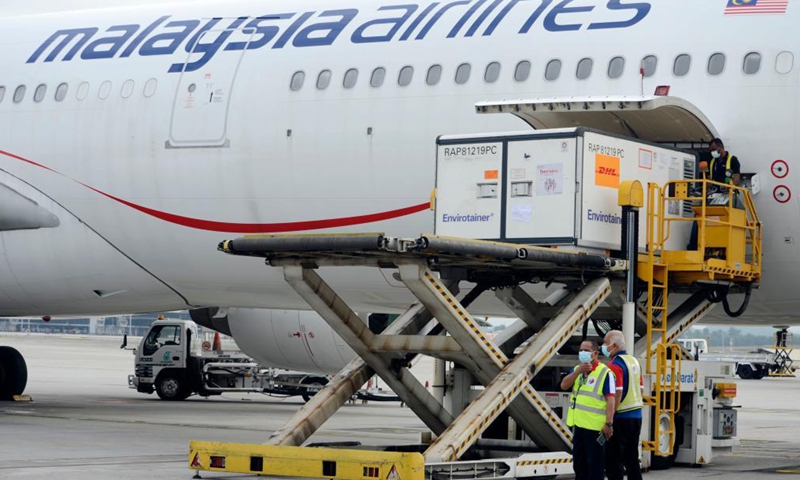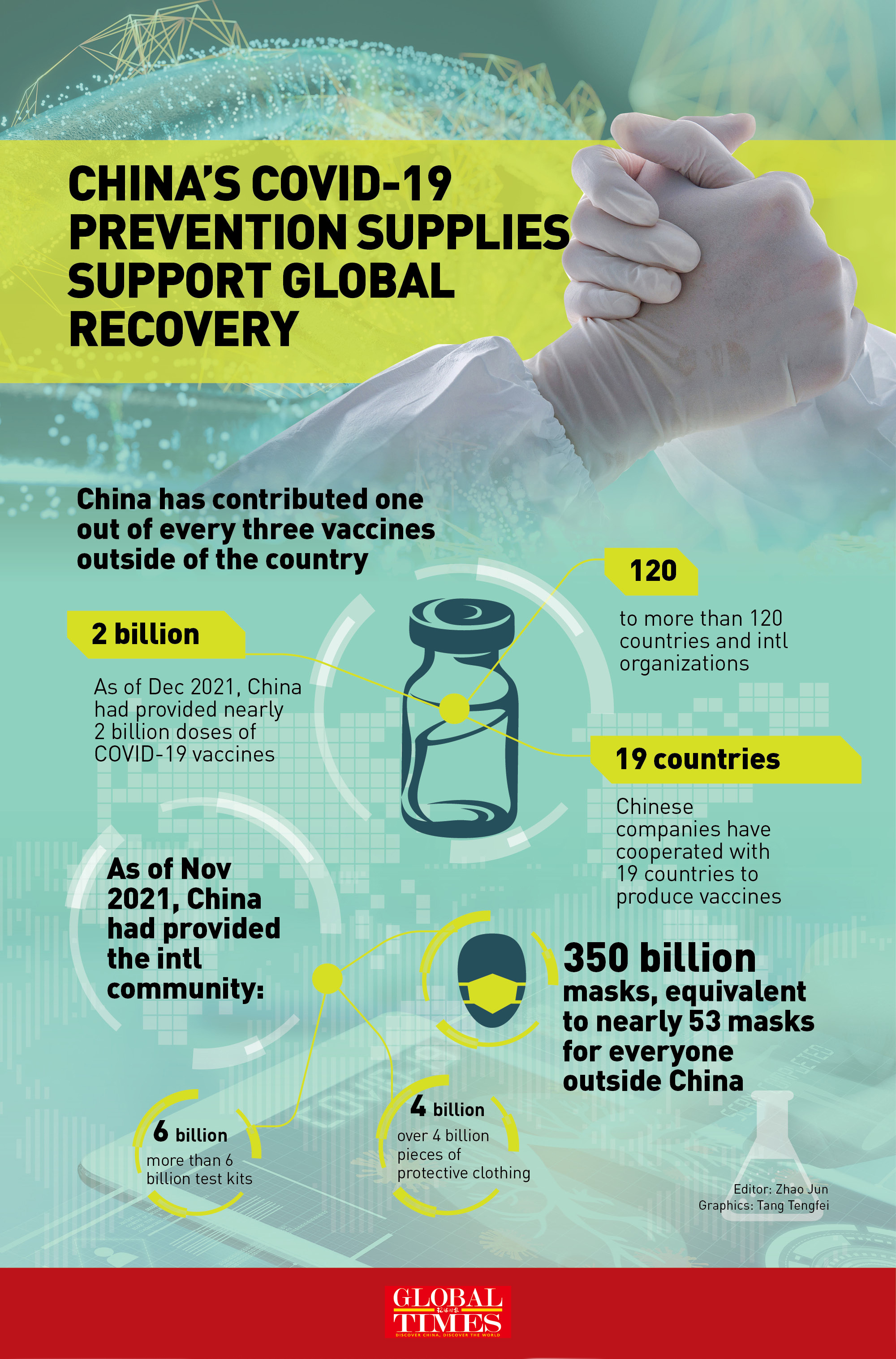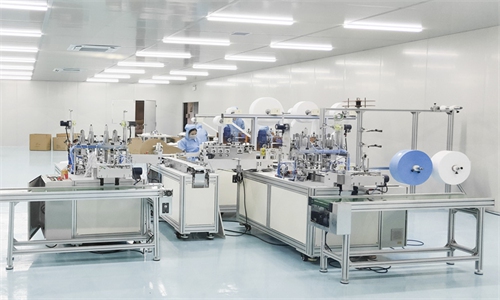Davos sheds light on vaccine inequity
Chinese model of donating, helping countries access vaccines an example for other major powers like US: experts

The first batch of the single-dose COVID-19 vaccine developed by Chinese company CanSino Biologics is seen at the Kuala Lumpur International Airport in Sepang, Malaysia, Aug. 20, 2021. Photo:Xinhua
World leaders at the ongoing World Economic Forum (WEF) said it is urgent to tackle vaccine inequity to end the pandemic as the Omicron variant continues to rampage across the globe. The immunization gap between rich and poor countries continues to widen due to imbalances in vaccine supply and inadequate facilities to support mass inoculation in places like Africa. As a major global vaccine player, China is committed to fulfilling its pledges by not only providing vaccines to developing countries but also transferring technologies to cover local needs, setting an example for other major powers like the US and some Western countries, which are urged to take more active moves.Ahead of a panel session scheduled on Tuesday called "Meet the challenge of vaccine equity" at the WEF's 2022 Davos Agenda virtual event, Tedros Adhanom Ghebreyesus, Director-General of the World Health Organization (WHO), said on Twitter that vaccine equity is an ethical, epidemiological and economic imperative. "If we don't end inequity, we don't end the pandemic and economic, social turmoil it causes," he said.
The WHO set targets last year for 40 percent of people around the world to be vaccinated against COVID-19 by the end of 2021, and 70 percent by the middle of 2022, according to media reports.
"Reaching the 70 percent target together is the only way to end the acute phase of the pandemic and drive global recovery," the WHO chief said.
Vaccine inequity is in the spotlight at this year's Davos forum. Chinese President Xi Jinping said in a special address to the forum's virtual session on Monday that strong confidence and cooperation represent the only right way to defeat the pandemic. Of particular importance is to fully leverage vaccines as a powerful weapon, ensure their equitable distribution, quicken vaccination and close the global immunization gap, so as to truly safeguard people's lives, health and livelihoods, Xi said.
Other speakers at the forum expressed similar views. UN Secretary-General Antonio Guterres urged all participants to focus on the major urgent issues, one of which is confronting the pandemic with equity and fairness, according to a statement on the UN website on Monday.
Considering the global vaccination goal was to reach 70 percent of the population by mid-2022, "the world was nowhere even close," he said.
Every country which has the capability to successfully research and develop COVID-19 vaccines will first fulfill its own needs. Thus developed nations are endowed with greater accessibility to vaccines while poorer countries largely rely on international resources, and therefore receive far fewer vaccines, an official from the Chinese National Health Commission told the Global Times on Tuesday.
"Vaccine scarcity is not the only problem developing nations face, there are others such as inoculation capability," he said.
There are different reasons behind the world's vaccine inequity, as in the early stages of vaccine rollout, countries were striving to increase production while now, developing countries in places like Africa, some of which heavily rely on vaccine donations, are struggling to fill the gap in infrastructural and organizational capacity to administer vaccines while facing difficulties in storing vaccines, Chinese experts said.

China's COVID-19 prevention supplies support global recovery. Graphic: GT
Role of China
In helping other countries fight the pandemic, China has been delivering on its pledges regarding vaccine donations. Xi said on Monday that China has already sent over two billion doses to more than 120 countries and international organizations.
"China will provide another one billion doses to African countries, including 600 million doses as donations, and will also donate 150 million doses to ASEAN countries," he said.
As of December 2021, China has offered nearly 2 billion doses of COVID-19 vaccines, becoming the country that provides most vaccines to other countries.
China will donate another 10 million shots of vaccines to Egypt. Sinovac will also help Egypt to build a biggest and most advanced refrigeratory in Africa to restore vaccines, the Global Times learned from Sinovac.
A major reason about the low inoculation rate in African countries was when millions of vaccines "donated" to African countries by some Western countries are about to expire. The WHO Regional Office of Africa confirmed to the Global Times in a recent interview that vaccine discard in African countries is a noted situation. For example, on December 22, 2021, the Nigerian government destroyed more than 1.06 million doses of AstraZeneca vaccine at a landfill on the outskirts of the capital city Abuja.
And these vaccines were part of the more than 2.59 million doses Nigeria received from Europe in October 2021, and had expired in November, according to media reports.
"In some developing countries in Africa, besides the lack of public awareness on the importance of vaccination, they lack the supporting facilities to store the vaccines. Also, in some places, they don't have stable electricity systems, which may challenge the vaccine storage," Zhuang Shilihe, a Guangzhou-based immunologist, told the Global Times on Tuesday.
The vaccine inequity is not only rooted from the imbalanced supply but also the inadequate infrastructure and supporting systems, he said, noting that enhancing the public education on the vaccines is equally important.
Some experts who talked with the Global Times in recent interviews noted that the only sustainable way to ensure that Africa has access to the vaccines it needs is to encourage local production in the continent.
In filling the gap of vaccine inequity, China not only provided vaccines but also set up production base of semi-finished vaccines in 15 countries as of October 2021, providing technological assistance to countries in need.
So far, Chinese vaccine manufacturer Sinovac Biotech has supplied nearly 60 countries with more than one billion shots of COVID-19 vaccines. It has also been helping Brazil, Indonesia, Turkey, Malaysia, Algeria and Egypt to build local vaccine production factories, the Global Times learned from the company.
With the global efforts, some experts believed that the world can reach the 70 percent of inoculation target in mid-2022. "But the issue is technically we can reach the goal, if the new variant continues rampage, is such herd immunity effective in fending the epidemic risks?" Zhuang said.

